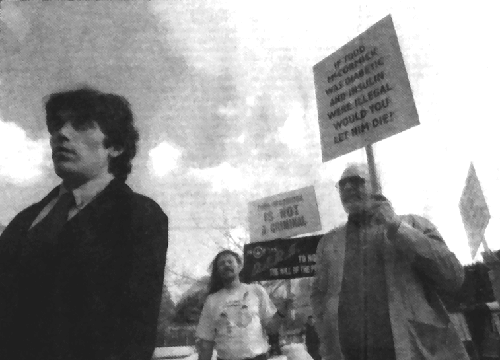


|
Todd McCormick, who had cancer nine times before he was ten, will ask a federal judge on Wednesday if he can use his medical marijuana while on bail. "It’s been terrible these past six months without my medication," said McCormick. "I’ve been in constant pain. I can’t sleep for more than an hour at a time. Every time I turn, the pain wakes me up." As a result of cancer treatment, McCormick’s top five vertebra were fused when he was three and one hip stopped growing when he was eight. "This is an unprecedented move," said McCormick’s attorney "We are asking a federal District Court Judge George King to allow someone to take a medicine, prescribed by his doctor. Normally, this is not a problem. Defendants out on bail are allowed to take morphine, cocaine, or any other prescription medication. In this case, however, we’re asking the court to permit the use of a Schedule I substance, where there exists no scientific reason why it should be so classified. It will take a great deal of courage and a great deal of compassion for the judge to rule in our favor, but what else can we do but ask? My client is suffering unnecessarily." On Wednesday, February 11, 1998, McCormick and Michael will file the motion at the Roybal federal courthouse in downtown Los Angeles and meet immediately after with the press at 1:30 p.m. on the courthouse steps. (Look for McCormick supporters with signs such as, "Let McCormick use his medicine" and "The people of California have spoken. Federal government, please listen.") The motion is online at www.marijuanamagazine.com. The motion also asks for a reduction of the $500,000 bail, put up by actor Woody Harelson. McCormick’s Bel Air address caused national headlines and punch lines when he was arrested on July 29, 1997. The Medical Marijuana Mansion, the press dubbed it. Jay Leno said if it were a movie, it should be called "Fresh Pot of Bel Air." Although McCormick was accused by the DEA of buying and selling marijuana, the federal grand jury found evidence of cultivation only. Cultivation is specifically permitted to medical marijuana patients under California law. McCormick leased the house from an advance he received to write a book about marijuana cultivation, on which McCormick is considered an expert. DEA agents destroyed McCormick’s research material--including a marijuana plant that had been alive since 1976. "I lost my work," said McCormick. "I lost my home. I’m living at a friend’s house now. I haven’t been able to work. When I can think about something other then the pain, I think about the ten-year mandatory minimum sentence I’m facing. I can’t tell you how this has destroyed my life." In 1995, McCormick opened the first compassion club in California, located in San Diego. There, he gave away marijuana to people in medical need. En route to opening a compassion club in his native Rhode Island, McCormick was arrested in Ohio. While in an Ohio jail, the DEA closed his San Diego club. When the Ohio charges were dropped, McCormick went to Amsterdam, where he deepened his knowledge of marijuana botany. He returned to California in 1996 after the passage of Proposition 215, the Compassionate Use Act of 1996. "With the passage of Proposition 215, I thought I could share what I knew about growing medical marijuana with other patients in California," said McCormick. "I thought the people of California had voted to let sick people have their medicine, and I thought the government would listen to the people and go chase murderers instead of medical marijuana users. I guess I thought wrong." "Mr. McCormick’s case is an unusual one, legally," said David Michael of the San Francisco law firm of Serra, Lichter, Daar, Bustamante, Michael, and Wilson. "Normally, in a battle between state and federal authority, the federal government represents the Constitution, so it usually an individual’s defends life, liberty, and the pursuit of happiness. Think of forced federal segregation in an Alabama school when the governor himself, George Wallace, had to yield to federal authority. In this case, however, the people of the State of California have taken the respected, honored, and valued position--which is that when people are sick, they should get the medicine they need--while the federal government has taken an inhumane stand against medical marijuana and the relief of human suffering that is, to quote the DEA’s own Administrative Law Judge, Francis L. Young, ‘unreasonable, arbitrary and capricious.’" (Judge Young’s 1988 ruling after almost two years of hearings included "The evidence in this record clearly shows that marijuana has been accepted as capable of relieving the distress of great numbers of very ill people, and doing so with safety under medical supervision. It would be unreasonable, arbitrary and capricious for DEA to continue to stand between those sufferers and the benefits of this substance in light of the evidence in this record." DEA Administrators Bonner, in 1992, and Constantine, in 1996, chose to ignore the judges ruling and keep the drug as Schedule I.) "Mr. McCormick represents the will of the people of California in fighting the staggering might of the federal government," said Michael. Is there any hope? "The DEA has, for the first time, passed the question of marijuana’s medical scheduling to the Department of Health and Human Services," explained Michael. "Perhaps we’re seeing some return to reason in our national drug policy regarding medical marijuana. The federal government is being cruel in its current treatment of Mr. McCormick. Can’t they just leave this young man alone to take his medicine in peace, and can’t those who want to jail him thank God they don’t have a condition that requires constant medication?" "It would be nice to have my life back," said McCormick. To read more and/or follow the Todd McCormick case follow
these links on the Table of Contents TO ARRANGE FOR AN INTERVIEW WITH McCORMICK or MICHAEL: |